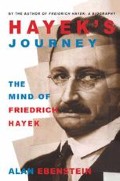Abstract
As with Mill and Marx, the question of Hayek’s relationship to the Chicago school of economics is one that is not always understood. When Hayek reemerged on the scene after receiving the Nobel Prize in Economics in 1974 (with socialist Gunnar Myrdal), after what seemed like almost decades of seclusion and isolation—almost as if Hayek had been punished and shunned for expressing such heterodox views in The Road to Serfdom—there was a tendency, in at least the popular media, to identify him with the Chicago school.
Access this chapter
Tax calculation will be finalised at checkout
Purchases are for personal use only
Preview
Unable to display preview. Download preview PDF.
Notes
“In the … 1990s.” Daniel Yergin and Joseph Stanislaw, The Commanding Heights (New York: Simon and Schuster, 1998), 14–15.
“In the … socialist” George Stigler, Memoirs of an Unregulated Economist (New York: Basic Books, 1988), 148–49.
“not until … Chicago.” In Don Patinkin, Essays On and In the Chicago Tradition (Durham, N.C.: Duke University Press, 1981), 266.
“writings and … ‘school.’” In Henry Simons, Economic Policy for a Free Society (Chicago: University of Chicago Press, 1948), v.
“always more … counterpart.” Ross Emmett, preliminary draft of “Evolution and Human Beings: Frank H. Knight on Cultural Evolution and the Defense of a Free Enterprise Society” (2001), 7.
“introduced me … view,” Milton and Rose Friedman, Two Lucky People (Chicago: University of Chicago Press, 1998), 32.
“When the … campuses …” New Individualist Review (Indianapolis: Liberty Fund, 1981), ix–x; as modified by Friedman in February 18, 2003 letter to author.
“A second … it.” The Essence of Friedman (Stanford, Calif.: Hoover Institution Press, 1987), 363.
“made it … influence.” In Friedrich Hayek, The Road to Serfdom, Fiftieth Anniversary Edition (Chicago: University of Chicago Press, 1994), ix–x.
“Adam Smith … view.” In Annelise Anderson and Dennis L. Bark (eds.), Thinking About America (Stanford, Calif.: Hoover Institution Press, 1988), 456, 459, 463.
Copyright information
© 2003 Alan Ebenstein
About this chapter
Cite this chapter
Ebenstein, A. (2003). The Chicago School of Economics and Milton Friedman. In: Hayek’s Journey. Palgrave Macmillan, New York. https://doi.org/10.1007/978-1-4039-7379-5_13
Download citation
DOI: https://doi.org/10.1007/978-1-4039-7379-5_13
Publisher Name: Palgrave Macmillan, New York
Print ISBN: 978-1-349-73063-6
Online ISBN: 978-1-4039-7379-5
eBook Packages: Palgrave Economics & Finance CollectionEconomics and Finance (R0)

